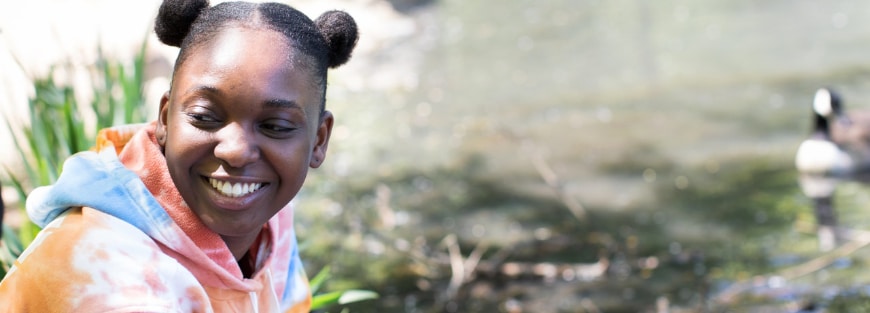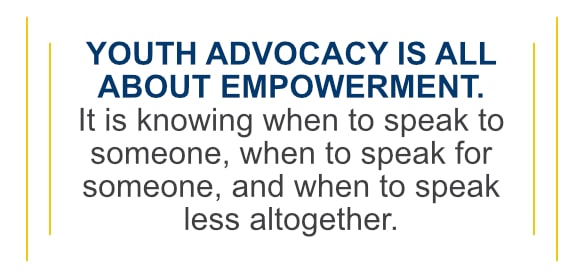Advocacy: Empowering Youth To Be Difference Makers
Posted by: DVULI | November 1, 2021

Opnion by Jon Coker (San Antonio 2010)
WHEN THE WORLD WAS SHUT DOWN, OUR YOUTH WERE SHUT UP.
The events of the past two years traumatically impacted our nation’s youth, and somehow, in all of the breaking news coverage, their stories were left out. We saw countless statistics about our youth, but we heard very few insights from their perspectives. When parents lost their jobs, their children did not eat. We saw their innocent faces plas- tered on food drive promos but never heard their voices. When the news preached the daily death tolls, our sons and daughters internalized anxiety in isolation. We saw them turn to destructive behaviors, and we tried to fix them rather than listen to the source of their pain. When schools shut down, our students were shut up and forced to strug- gle through the glitches of virtual learning. Most students in urban communities found themselves on the wrong side of the digital divide. Our students are challenged to perform at their district’s set standard of excellence, but only a few of them were adequately equipped to do so.
Psalm 127:4 says, “Like arrows in the hand of a warrior, so are the children of one’s youth” (NKJV). The psalmist compares children to arrows. Like arrows, it’s dangerous to launch a child into life without first aiming them. The trajectory of a young person’s life is shaped by the bal- ance of advocacy and affirmation—the voices that speak up for them and the voices that speak into them. Unfor- tunately, today, the arrows of our future rest on the brittle bowstrings of our negligence. The fifth verse of that text says, “Blessed is the man whose quiver is full of them. He will not be put to shame when he confronts the enemies at the gate.” If we aim our youth today, they will be our arrows of defense tomorrow. We can rest in our old age knowing our children will represent us in courtrooms, develop breakthrough cures and technologies, and guard the values that bind our families together.

I have served as a youth pastor in an urban San Antonio community for nearly 15 years. We learned that our success in reaching young people has been more connected to our presence than our preaching. We see great momentum in all expressions of our ministry, but nothing validates young gifts and voices like our attention. We would never suggest substituting the preaching of the gospel for casual social gatherings. However, I do have a strong sense that this generation needs more preaching pastors—advocates who will champion their cause from the mountaintops while tending to their wounds in the valley trenches. They do not need people to fix them. They need people to understand them, and we have allowed too many voices to define, diminish, and diagnose them without passing them the mic. Kids are coping with a rapidly changing world. Industry leaders are determining what is best for them without considering the pain they are suppressing.
Several organizations, including the Kaiser Family Foun- dation (KFF), reported significant surges of mental health symptoms in teenagers since last year. Many student groups aging between 13 and 17 were surveyed and reported increased symptoms of anxiety (73%), depression (67%), and suicidal thoughts (48%). Couple those experiences with the isolation of quarantine, the absence of deep, meaningful relationships, and the stresses of managing a plummeting grade point average via Zoom. The West Virginia Education Association reported that in 2020, the average American teenager spent an astounding nine hours a day entertain- ing themselves with digital technology, video games, social media, and streaming videos. This excessive screen time does not include hours spent during the regular virtual school day.
 Our kids are seeking an outlet and settling for an escape into the virtual world. The internet is the new mission field. Although the most at-risk youth reside in urban communities, they live online. To be a “fisher of men” today requires casting our net into the net. Who better to reel in the lost souls of the deep than the stakeholders who have seemingly mastered every app? They are the innovative entrepreneurs who discover ways to manage e-commerce businesses from their phones while in class.
Our kids are seeking an outlet and settling for an escape into the virtual world. The internet is the new mission field. Although the most at-risk youth reside in urban communities, they live online. To be a “fisher of men” today requires casting our net into the net. Who better to reel in the lost souls of the deep than the stakeholders who have seemingly mastered every app? They are the innovative entrepreneurs who discover ways to manage e-commerce businesses from their phones while in class.
They launch TikTok channels and podcasts to cancel what they hate and normalize what they love. It is time to pro- vide our youth with the space, voice, and power to make their mark. Youth advocacy is all about empowerment. It is knowing when to speak to someone, when to speak for someone, and when to speak less altogether. Today’s youth leaders are the opportunity brokers who can make room for our next generation to excel in every industry.
The path forward is simple. Give a kid a fish, and you feed him for the day. Teach him how to fish, and you feed him for a lifetime. Teach him how to own the pond, and you shift the trajectory of future generations to come. These are not multiple-choice options. They are the progres- sions of true advocacy.
 >> Step One: GIVE A KID A FISH
>> Step One: GIVE A KID A FISH
Advocate on this level by simply meeting the felt needs of the ones entrusted to your care. When students come to you hungry, do not try to teach them. Feed them. When young people trust you with their wounds, tend to them, and fight for them.
>> Step Two: TEACH HIM HOW TO FISH
Advocate on this level by teaching youth how to advocate for themselves. Create judgment-free spaces where they feel safe to discuss their ideas and test their gifts. While they are building their confidence, create opportunities for them to be the difference makers. Change the traditional roles. Pass them the mic and take a seat in the audience. Lead them while they lead their peers and teach them how to meet the felt needs of others.
>> Step Three: TEACH HIM HOW TO OWN THE POND
Advocate on this level by teaching them how to advocate for others.
Jon Coker (San Antonio 2017 | @JonCockerTV) is the Student Ministries Director at Christian World Worship Center in San Antonio, Texas. He is also a multimedia journalist and digital reporter for KENS-5, a public speaker, and a contributing writer. jcoker34@gmail.com
This article was published in the Fall 2021 issue of DVULI’s On the Level print newsletter.

